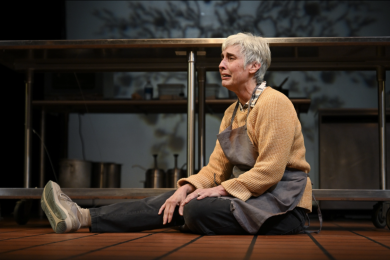REVIEW: 'Homegrown' at The Playwrights' Center
Review

At first, I thought the problem was structure, and I thought the problem was that the play’s skin was too thin. Such that one could see the architecture of its bones underneath. Which made me feel sort of empathetically naked, and I wanted to hurry and cover up the script, which was too clear.
I thought that was the problem – that you could hear the whirrings of the cogs and wheels, the workings of the playwright’s intent. Which was, in itself, a good intent: to write a play about a family. Family plays are good; they are one of the best American stories, and lots of us like stories in which we Vaseline the footlights and see our tweaky, weird families uplit in a soft glow. Which, if that was the intent, the playwright did: I felt lulled throughout, even during explosive intense sections, which were so neatly placed along the spectrum of the play that I found a certain satisfaction in each element of this story falling together as it should.
But still, I felt uneasy. I could hear the clicking of the through-line as it fell into place in much too Lego-like a fashion—each piece fitting to each with a snap. By midway through the 90-minute production of Homegrown, one could take a reasonable gander at what would come next, because the play thus far had adhered to a relatively strict – actually, an unvarying – structure of threes.
Insofar as this is a lovely play, and really beautifully spoken, with wonderful dialogue, mostly well-acted, technically precise and with really interesting tech – insofar as the play was intended to be good, and to achieve a pleasurable symmetry, and be made of solid components, it did indeed succeed.
In this case, I have it on good authority that the playwright was intending to write just that: a good play, for an audience of normal people, that would give them pleasure, and not draw too much attention to itself, being a Midwestern play, or modest or just not flashy, and not writing for theater nerds who like to snuffle and paw around in plays, examining them in excessive, prurient detail.
So what if a playwright’s intention is to break no rules, make no statement, examine nothing meta-ish, but for once to write a lovely, tender, enjoyable play about a family being drawn back to its roots, and she succeeds? Is that enough? Is her intention, in itself, enough to make a play worthwhile? Or do I/we demand that there be something more? Something more substantive to chew on, something that has texture, something having density and weight?
Do I demand something of a play that exceeds or simply differs from the playwright’s intent? And if so, did I totally fail to get it? Is the failure of imagination my own? Was the play not written for me? For ex.: I went to see Detroit the other night with a 75-year-old man who has a special comb for his white beard. As the lights came up after Detroit, he turned to me, stunned, and said, “Well! That was different!” That play was not written for him; that doesn’t make it a bad play at all; it was grim, freaky, and went off half-cocked, and it was written for me, and I “got” it, or at least got something wonderful out of it, fissures and cracks and warts and all.
But Homegrown was not for me. Though it has few fissures, and no warts. It is good. It kind of glows, and in the theater I felt enveloped by its glow. I left the Playwright’s Center bouncing along on a balloon of happy. But after a few days, the patina had worn off. And then it was translucent, like a person who is disconcertingly pale, and they look like you could peel their skin off and there they’d stand, extra-naked, with their structure showing through.
The structure was clear, the plot was familiar, the characters verging on stock – in other words it was totally representative of life. Which is made up of emotional drama and flaky mothers and hostile siblings and stunted goals and the fact that all of us really sort of are a little two-dimensional, and our lives do get a little predictable at times, on occasion becoming really obvious, because we (people, humans) seem compelled to keep jogging on our little gerbil wheel and reciting our same stories to one another and ourselves. The family story, the love story, the war story, the identity story (and the regrettable history play, of which no more shall be said) – I like these stories myself, they are as compelling to me as to anyone else. I have my set of stories, just as I have my favorite plays, which speak to me in some way, which resonate in my ribs and go careening around my skull.
So I’m not sure why this play did not resonate with me. I have been in the selfsame situation: a family’s unexpected reunion, which goes terribly awry, involves a number of unnecessary plots, has too much to drink, says too much, dances around the room, and rights itself abruptly at the end – these are entirely realistic things. So is there something wrong with a realist play? Why should I complain if the playwright succeeds in creating a play that really does imitate life?
I’m uncomfortably reminded of the current kind of twee attitude toward realism and photorealism in visual art. There is a running complaint about realist work that suggests it’s somehow inferior to, or at least less fancy than, abstract forms, even if it’s wildly superior in a technical sense. What’s the matter with representing the thing itself, the thing as such?
People in theater talk a lot about how The General Audience/Those People can feel alienated by self-consciously or just intentionally challenging plays. I have never known people who did not prefer to be challenged by plays, but then I live in my provincial liberal indie bookstore world which consists of New York, Chicago, and SF, but actually orbits around Minneapolis, the mid-sized sun. I like this world, where The General Audience actually consists of basically you there reading this and me here tapping it out. I feel cozy here, my preference in plays being saturated, satisfied, practically glutted with stuff that makes me think.
And my bias is toward things that make me think. I can be perversely pleased by theatrical disasters simply because they engaged me, allowed me to argue and assent, gave me leave to have a mini-gamut of human experience in approx. 2 hrs. And I can be weirdly distressed by perfect productions that show no seams, no texture, no depth, but are very pretty and spherical and easily held in the palm of one’s hand.
The Workhaus Collective is, I think, the most generative, imaginative, and productive company in town. They are in the business of developing new plays, giving particular primacy to the vision of the playwright. I think this is brilliant. And sometimes I hate the play. But I always see the play, because it always make me think about theater – new theater, fresh, raw, imperfect, uneven, in process. That’s the culture of the Playwright’s Center itself, and one of its goals – to give their core playwrights time and space and funds to create new work. Some of the work that comes out of Workhaus, out of the PWC, and out of the playwrights they serve, is breathtaking or deeply thoughtful or glimmering with the marks of vision underneath the awkwardness of untested work.
But every now and then, there is something that does not knock me out of the park. And I’m wondering if that can be, in this case, because the play felt too polished. Not in process. Not asking questions of the audience or itself. It was a play, a good solid play, and it asked nothing of me.
And if it asks nothing of me, then I cannot work at it, cannot feel my way into it, cannot really enter it at all. I have been asked to watch and enjoy. But what will I have done? How will I have engaged?




